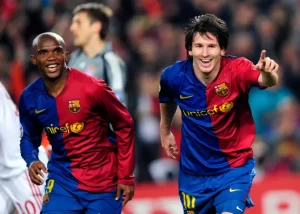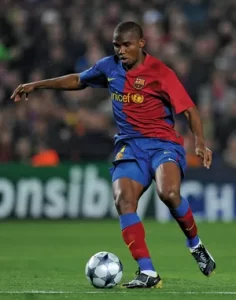By Jean Baptiste Ndabananiye
Success does not merely involve raw talent, but the wisdom and guidance we receive along the way. Samuel Eto’o’s mentorship of Lionel Messi provides a testament to this truth. Despite Messi’s innate brilliance, it was reportedly Eto’o’s crucial advice that helped him to refine his potential and guided him through key challenges in his early career. This act of selflessness highlights that no one achieves greatness alone—behind every successful individual is a mentor or guide who helps them to navigate their path.

Moreover, Messi’s gratitude and humble acknowledgment of Eto’o’s role in his success reinforce the importance of humility. Greatness does not only mean achieving accolades but also about remaining grounded and recognizing those who helped along the way. Eto’o’s legacy, not just as a player but as a mentor, reveals the transformative power of guidance, support, and humility in the pursuit of excellence.
So, remember: embrace the wisdom of mentors, stay humble, and acknowledge the contributions of those who shape our journey. True greatness constitutes a blend of talent, hard work, and the generosity of those who guide us toward our destiny. The article consists of these major parts:
- More details on Messi’s recognition to Eto’o
- How to best provide adice which is certainly well recieved?
- The art of giving advice that resonates
- Life lesson: resilience throughout middle challenges
More details on Messi’s recognition to Eto’o
The above information was disclosed by The Sun’s 14 Jul 2023 article headlined “HEART OF A LION Samuel Eto’o reveals Lionel Messi thanked him for career-saving advice which fixed issues as a Barcelona starlet.”
The duo played together at the LaLiga giants for six years from the Argentine’s debut in 2003 to 2009 when Eto’o’s left Barcelona for Inter Milan. “While many tipped the diminutive, fleet-footed young Messi for greatness from an early stage, Eto’o has revealed that his former team-mate felt indebted to his crucial advice,” The Sun reports.

According to this mega media house, Eto’o’ said “[Messi] confessed to me that, thanks to my advice, which I am not going to reveal, his career had changed. One day he said ‘Thanks to Samuel, my career changed’. He had to fix two or three things but he has always had the talent.”
“I am proud and happy to see that he has written history which has yet to be finished, and it will be very difficult to beat what he has written. He was going up and down from La Masia to the first team. We already knew that one day Messi was going to be what he is. I am happy because he has made it in the end, thanks to himself. He showed me that nothing has changed. He is still the good person I met.”
How to best provide advice which is certainly well received?
Numerous people, despite their best intentions, struggle to give advice that is truly helpful or well-received. The problem often lies in a way advice is delivered. Whether it’s too forceful, poorly timed, or lacking empathy, the well-meaning counsel can fall flat, leaving the recipient feeling misunderstood or even resistant.
Too often, advice is furnished from a place of assumption rather than understanding, and without considering the individual’s specific needs and perspective. As a result, the effort to guide someone forward can end up creating more harm than good. Effective advice requires more than just knowledge—it requires a thoughtful, respectful approach that connects with the person on a deeper level.
Though Life In Humanity has not determined whether or not Eto’o has heeded appropriate techniques to provide advice, we are convinced that he has. As already suggest, there exist convenient ways in which you have to channel your advice, if you want to be assuredly successful. The following part focuses on them.
Empathy and understanding—show that you care genuinely about the person to whom you are giving advice and their situation. This creates trust and openness. Listening actively before offering advice helps you to understand their needs and challenges better.
Tailor your advice to the individual—avoid one-size-fits-all solutions. Offer advice that aligns with the person’s personality, circumstances, and values. Personalization shows respect for their unique situation.
Offer clear and actionable steps—people appreciate advice that is practical and easy to follow. Break down the advice into simple, actionable steps that the person can implement without feeling overwhelmed.
Be positive and encouraging—even if the advice involves difficult truths, frame it in a positive light. Focus on the potential for growth and improvement, and offer support for them to succeed.
Use humility and share your experience—rather than positioning yourself as an expert, share advice from your own experiences. This renders the advice feel more relatable and less like a lecture.
Be non-judgmental—offer your advice in a way that respects the person’s choices and autonomy. Avoid making them feel judged or criticized. The advice should feel like guidance, not a directive.
Timing and setting matter—provide advice at the right time and place. Ensure that the environment is conducive to receiving feedback, and that the person is in the right mindset to hear and consider your words.
Keep patience—sometimes people need time to process advice before they act on it. Remain patient and allow them to reflect, offering ongoing support if needed.
The art of giving advice that resonates
The following is my tactic to advise people, and it has always proven successful. I first recognize and appreciate qualities that the person I am advising possesses. Building on this and based on tangible reasons proving that I am right in issues which I raise as far the advice is concerned, I humbly recommend the person action to take. Unlike some other people who use a tone seeming rude or disrespectful, I use a soft tone so that I cannot seem to force the person to accept my advice, so that I can shun a clash with the person.
I have found this approach both thoughtful and effective. By first acknowledging the qualities and strengths of the person you’re advising, you create an atmosphere of respect and affirmation. This recognition not only boosts the recipient’s confidence but also helps them to feel valued, rendering them more open to receiving guidance.
When you back up your advice with tangible reasons and real examples, you build credibility and clarify that your recommendations are rooted in thoughtful consideration. Your humility in offering solutions, without sounding forceful, allows the recipient to feel empowered to make their own decisions, rather than feeling pressured into following your advice.
This soft, respectful tone encourages collaboration rather than conflict, fostering a positive exchange that increases the likelihood of your advice being well-received and acted upon. This method represents a great example of how empathy, reason, and respect can create all the difference in giving advice that truly resonates.

In this regard, I am inspired by Catherine the Great who reigned as Russia’s empress for three decades, specifically 34 years— from 1762 to 1796. She once said “I praise loudly. I blame softly.” If we should blame softly and praise softly, we ought to advise softly while profoundly recognizing great attributes that the person boasts.
This forms a powerful guiding principle in the art of advising. It reflects the understanding that praise, when done with enthusiasm, can uplift and motivate, while criticism, if done too harshly, can alienate and discourage.
By profoundly recognizing the great attributes that a person already possesses, you set the stage for a positive, constructive conversation. This approach not only builds trust and rapport but also encourages openness, as the individual feels seen and valued. The core of this method lies in showing humility and understanding, providing advice that feels like a natural extension of their own strengths, rather than a correction of their weaknesses.
So, just as Catherine the Great wisely understood the importance of balance in praise and blame, we too should advise softly—ensuring that our guidance is entrenched in respect, empathy, and a deep recognition of the individual’s potential. This approach allows our advice to resonate deeply and be well-received, fostering positive growth and cooperation.
Life lesson: resilience throughout middle challenges
High achievers often embark on their journeys with a spark of potential and a dream, but the road to greatness is rarely smooth. Along the way, most encounter a critical middle phase—marked by seemingly insurmountable challenges, doubts, and setbacks—that tests their resolve.

The lesson stands clear: if the middle of your is maximally challenging, facing apparently unsurmountable difficulties, don’t worry; instead, reenergize yourself and remain firm enough to confront the difficulties. Most high achievers—though they and others around them spot their potential at the beginning— go through seemingly impossible-to-handle problems in the middle of their path from the starting point of pursuing their dreams to the point where they realize their potential.
If you are facing difficulties that appear indomitable, take heart. This phase is not the end; it simply constitutes the proving ground where your strength, determination, and vision are refined. Instead of succumbing to despair, reenergize yourself, reaffirm your commitment, and face these challenges with unwavering resilience.
Consider the journey of many exceptional individuals— like Messi—who, despite early promise, needed mentorship and humility to navigate through obstacles. This middle phase, though daunting, is where character is forged, skills are sharpened, and resilience is cultivated—the very ingredients necessary to turn potential into realized greatness. It is this phase which has permitted Messi to smash such various records that he is widely regarded as one of the greatest footballers of all time.
His extraordinary talent, skill, and achievements on the field have cemented his place in football history. He has become Barcelona’s all-time top scorer and the top scorer in La Liga history. His career spans over two decades, maintaining an extraordinary level of performance. He is the most decorated player in the history of the Ballon d’Or (golden ball) award, with eight titles. Those are just few records that he has broken.
Remember, greatness is not achieved in a straight line. It is a journey of perseverance, growth, and the ability to remain firm in the face of adversity. Whether in sports, business, or life, those who persist through the middle challenges emerge not only stronger but also equipped to achieve their full potential. Recall that the stunning personalities—Tony Robbins, Oprah Winfrey, the late Nelson Madiba Mandela who languished in prison for 27 years and finally became South Africa’s first Black President, and even the first world billionaire: Elon Musk— all encountered an extremely bitter middle.